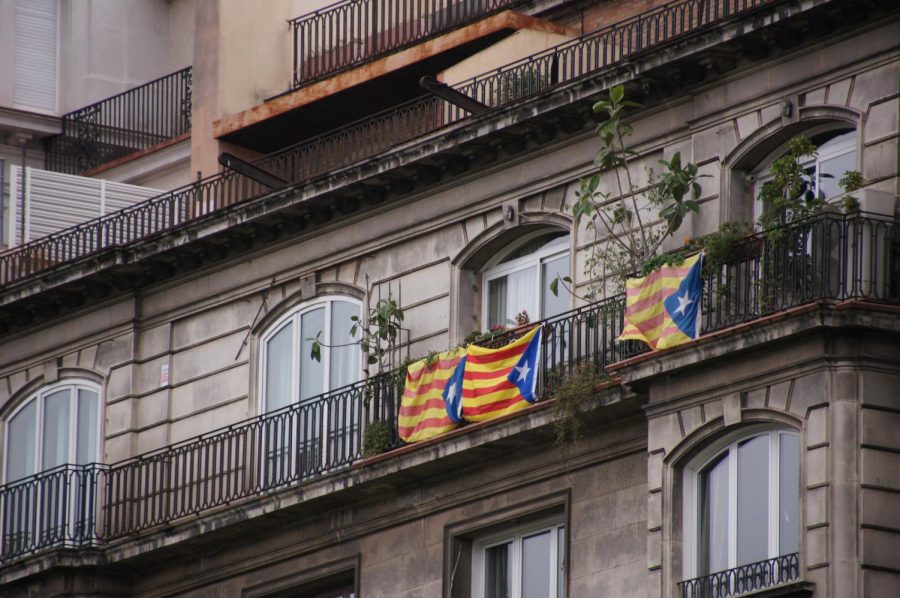Fredrik Rubensson/Creative Commons
Catalonian flags hang on a balcony
Everything you need to know about the political crisis in Barcelona
What study abroad guides fail to mention
October 6, 2018
Take a walk down any residential street in the city of Barcelona. You will find countless balconies with flower pots, people smoking cigarettes and Catalonian independence flags. The blue, yellow and red flags represent not just pride, but the independence movement of Catalonia and a conflict that dates back to the Middle Ages.
Barcelona has become a popular destination for young tourists and students. However, a majority of the students who visit this city — including myself when I visited — are not aware that its autonomous community, Catalonia, is undergoing a political battle to gain independence.
Is there still an ongoing conflict in Barcelona? Yes. Should you stay home to avoid it? No. What you can do, though, is educate yourself.
Catalonia a region in Spain with its own language and holidays, such as the romantic festival, Día de Sant Jordi. It even has its own flag — its four red stripes and five yellow stripes are distinct from the two red stripes and one yellow of the Spanish flag.
Spain became an official republic in 1931, uniting 17 different regions, including Catalonia. Catalonia was declared autonomous which meant the region had its own government. This autonomy lasted until Francisco Franco came into power in 1939 and set strict standards that outlawed the Catalan language, literature, government and culture; and solely promoted Spanish unity. Franco’s death in 1975 marked the end of his dictatorship, but three years passed before Catalonia regained its autonomy.
Professor Guillem Molla, Catalan Language Program Director at the University of Massachusetts Amherst, explained the cause of this long-term conflict in a lecture.
“After Franco died and [there had been] 40 years of dictatorship, there was a transition to democracy. The past was really heavy, and nothing really changed from a Catalan point of view,” he stated.
Some of the animosity felt during the time of Franco’s dictatorship is still present in Spain today. In 2017, Spain imposed direct rule over Catalonia to overturn a referendum that voted in favor of freedom. Though the Catalonia of today has flourished in terms of industry and independent culture, it continues a rivalry with Madrid that includes not only soccer but a fight for self-rule.
You do not have to participate in the independence movement to be educated. The more you know about this political conflict, the more prepared you will be for your time abroad.
If you are not culturally sensitive and aware, you might end up embodying the stereotype of an ignorant American. Imagine if an international student moved to the United States and said, “I don’t know who Donald Trump is, but I can take you to the coolest place in SoHo.”
For my first few weeks as a student in Barcelona, I was blind to the major conflict. Back then, I had small interactions with native Catalonians who hinted about tension in the city.
One day, with my limited Spanish speaking skills, I sparked a conversation with a saleswoman who was helping my roommates and me buy sheets. We were naïve and she was friendly, so we asked questions that were so stereotypical, we might as well have been wearing American flags.
I asked her when the “siesta” occurred, which by my interpretation meant, “What time would Barcelona shut down for the city-wide nap?”
She made it a point to tell me that she was Catalan and implied that, for this reason, she did not participate in the “siesta.”
I did not understand her response and continued to discuss sheets. It wasn’t until I visited Valencia, a city that does partake in the siesta, that I knew what she meant.
Catalans do not see themselves as Spaniards, just as Spaniards do not see themselves as Catalans.
Molla alluded to this point, saying: “Spain has an idea of what it should be; Catalonia thinks of it in a completely different way.”
He went on to explain that Spain believes the country should stay united, whereas Catalonia wants to divide from its oppressor.
Last October, about 90 percent of the Catalonian population voted for independence. However, only about 40 percent of the population voted, so the Spanish government declared the vote illegal.
“It has been like this for many, many years and isn’t going to change anytime soon,” Molla declared with a sigh.
This issue is deeply rooted in Spain’s history. As an outsider, it is fascinating to follow first-hand. Educate yourself. Talk to the people, immerse yourself in the culture and enjoy some tapas along the way.
Email Jordan at [email protected] or follow her on Twitter @jordan_reisman.
